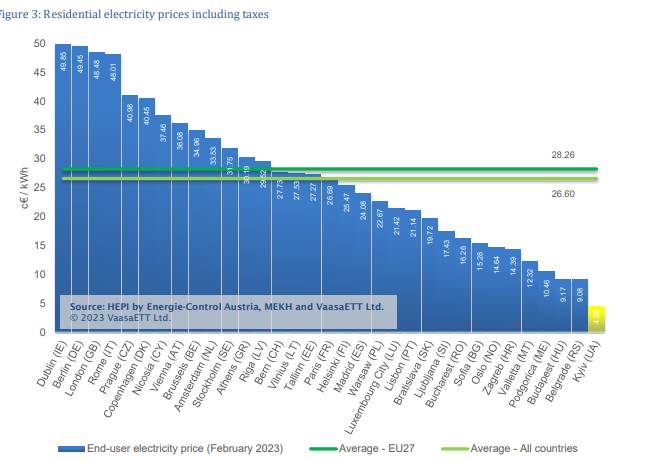Household electricity prices in Greece followed a reverse trajectory compared to Europe, where there was a significant decline.
The above is captured in the February HEPI index, which measures residential electricity prices in 33 European cities.
According to the monthly survey, last month was dominated by overall reduction in electricity tariffs for the fourth month in a rowin contrast to the upward trend recorded between February and October 2022.
Contractions prevailed in most cities compared to January: Stockholm (-28%), Rome and Tallinn (-25%), Helsinki (-24%), Copenhagen (-23%), Oslo (-12%), Brussels and Lisbon (-11%), Berlin (-9%), Riga (-5%), Vienna and Vilnius (-2%) and Nicosia (-1%).
The HEPI conclusion is that prices have remained stable in about half of the capital cities, while prices have declined in some cities.
This may be mainly due to the decline in the wholesale market for various reasons. This is a relatively mild winter, which has led to a decrease in demand and an increase in the production of renewable energy, especially wind power. Large-scale energy support measures taken by European governments to mitigate the impact of the energy crisis on household bills also contributed to lower prices for end users.
Unlike the aforementioned European cities, Athens has fixed electricity tariffs for residential consumers. The Greek capital was, along with three others, the only ones where prices rose: Paris (9%), Madrid (8%), Athens (6%) and London (3%). But why did Athens become an exception to the rule in February, when it became easier for most households in Europe to pay for electricity?
The authors of the monthly HEPI report give the answer: “The increase in prices in the retail electricity market is mainly due to the reduction of government subsidies,” they say. – For 90% of households, subsidies have fallen from €330/MWh (€0.33/KWh) to €40/MWh (€0.04/KWh). The reduction in the subsidy is due to the fall in wholesale market prices.”
As a result after many months, Athens has climbed higher in the relative ranking of 33 citieswho participated in the survey. In particular, the average price for households was 0.3019 euros per kilowatt-hour, or 30.19 eurocents per kilowatt-hour.
The Greek capital has risen to 12th place from 15th place in January of the corresponding list.
The most expensive city is Dublin, where the price of a kilowatt-hour for residential consumers is 0.4985 euros or 49.85 cents. The second highest price is paid by residents of Berlin, at 0.4945 euros per kilowatt-hour, or 49.45 cents per kilowatt-hour. In third place is London with 0.4848 euros per kilowatt-hour or 48.48 eurocents per kilowatt-hour.
However, despite the above changes, Greece remains in the middle of the ranking of countries on the level of electricity prices for households.







More Stories
Greece: growth in deposits from households and businesses in March 2024
How much will it cost a Greek family to celebrate Easter?
EU employment record: Greece "stuck" in a low position